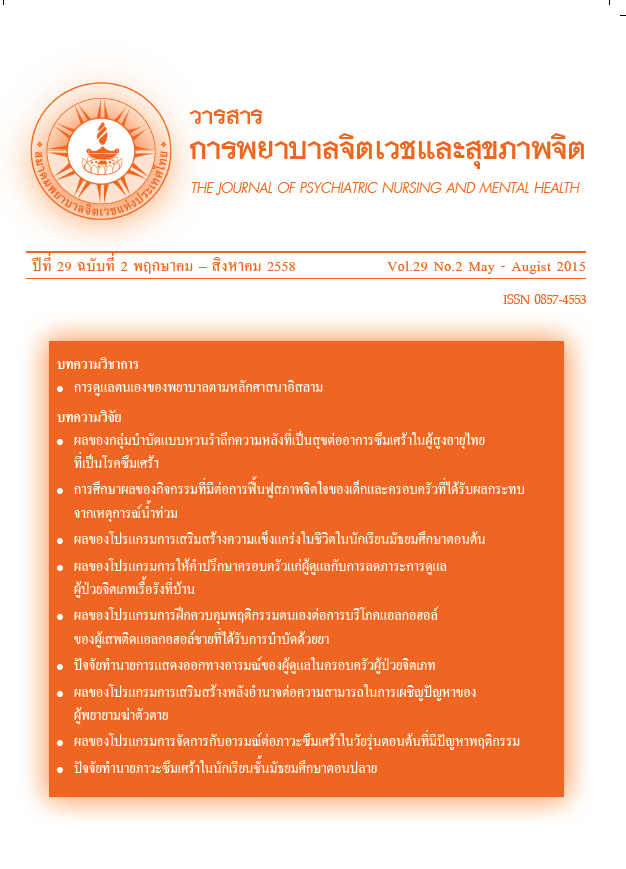ผลของโปรแกรมการฝึกควบคุมพฤติกรรมตนเองต่อการบริโภคแอลกอฮอล์ของผู้เสพติดแอลกอฮอล์ชายที่ได้รับการบำบัดด้วยยา THE EFFECT OF BEHAVIORAL SELF – CONTROL TRAINING PROGRAM ON ALCOHOL CONSUMPTION IN MALES WITH ALCOHOL DEPENDENCE RECEIVING MEDICAL TREATMENT
Main Article Content
บทคัดย่อ
Objectives: This study was a quasi-experimental pretest-posttest control group design. The objectives were to compare: 1) alcohol consumption of males with alcohol dependence before and after receiving behavioral self-control training program, and 2) alcohol consumption of males with alcohol dependence who received behavioral self-control training program and those
who received regular nursing care.
Methods:The sample consisted of 60 male in-patients with alcohol dependence who met the inclusion criteria and did not wish to attend rehabilitation period in Princess Mother National Institute on Drug Abuse Treatment, Pathumthani. They were matched-pair by times for treatment and randomly assigned into the experimental and control groups, 30 subjects in each group. The experimental group received the Behavioral Self-Control Training Program developed by the researcher and the control groups received regular caring activities. Research instruments comprised of: 1) Behavioral Self-Control Training Program, 2) The Alcohol Consumption Assessment (ACA), 3) Controlled Drinking Self Efficacy Scales, and 4) Demographic questionnaire. All instruments were verified for content validity by 5 professional experts. The 3rd instrument had Cronbach’s alpha coefficient reliability of .92. Descriptive statistics and t-test were used in data analysis.
Results: The findings of this research are as follows: 1. Alcohol consumption of males with alcohol dependence who received the behavioral self-control training program was significantly lower than that before (p < .05). 2. After experiment, alcohol consumption of males with alcohol dependence who received the behavioral self-control training program was significantly lower than those who received the regular nursing care (p < .05).
วัตถุประสงค์: การวิจัยครั้งนี้เป็นการวิจัยกึ่งทดลองแบบสองกลุ่มวัดก่อนและหลังการทดลอง มีวัตถุประสงค์เพื่อเปรียบเทียบ 1) การบริโภคแอลกอฮอล์ของผู้เสพติดแอลกอฮอล์ชายก่อนและหลังได้รับโปรแกรมการฝึกควบคุมพฤติกรรม ตนเอง 2) การบริโภคแอลกอฮอล์ของผู้เสพติดแอลกอฮอล์ชายระหว่างกลุ่มที่ได้รับโปรแกรมการฝึกควบคุมพฤติกรรมตนเองกับกลุ่มที่ได้รับการพยาบาลตามปกติ
วิธีการศึกษา:กลุ่มตัวอย่างเป็นผู้เสพติดแอลกอฮอล์ชายจำนวน 60 ราย ที่เข้ารับการรักษาแบบผู้ป่วยในระยะบำบัดด้วยยาซึ่งมีคุณสมบัติตามเกณฑ์ และไม่ประสงค์เข้ารับการรักษาในระยะฟื้นฟูสมรรถภาพ สถาบันบำบัดรักษาและฟื้นฟูผู้ติดยาเสพติดแห่งชาติบรมราชชนนี จังหวัดปทุมธานี ได้รับการจับคู่ด้วยจำนวนครั้งของการเข้ารับการบำบัดรักษา และสุ่มเข้ากลุ่มทดลองและกลุ่มควบคุม กลุ่มละ 30 ราย กลุ่มทดลองได้รับโปรแกรมการฝึกควบคุมพฤติกรรมตนเอง ส่วนกลุ่มควบคุมได้รับการพยาบาลตามปกติ เครื่องมือที่ใช้ในการวิจัยคือ 1) โปรแกรมการฝึกควบคุมพฤติกรรมตนเอง 2) แบบประเมินการบริโภคแอลกอฮอล์ (The Alcohol Consumption Assessment: ACA) 3) แบบสอบถามเจตคติในการควบคุมพฤติกรรมการดื่มแอลกอฮอล์ (Controlled Drinking Self efficacy Scales) 4) แบบสอบถามข้อมูลทั่วไป เครื่องมือทุกชุดผ่านการตรวจสอบความตรงเชิงเนื้อหาจากผู้ทรงคุณวุฒิจำนวน 5 ท่าน เครื่องมือชุดที่ 3 มีค่าความเที่ยงอัลฟาของครอนบาค เท่ากับ .92 วิเคราะห์ข้อมูลโดยใช้สถิติร้อยละและใช้สถิติที
ผลการศึกษา: ผลการศึกษาสรุปได้ดังนี้ 1) การบริโภคแอลกอฮอล์ของผู้เสพติดแอลกอฮอล์ชายหลังได้รับโปรแกรมการฝึกควบคุมพฤติกรรมตนเองต่ำกว่าก่อนได้รับโปรแกรมฯ อย่างมีนัยสำคัญทางสถิติที่ระดับ .05 2) การบริโภคแอลกอฮอล์ของผู้เสพติดแอลกอฮอล์ชายกลุ่มที่ได้รับโปรแกรมฯ ต่ำกว่ากลุ่มที่ได้รับการพยาบาลตามปกติ อย่างมีนัยสำคัญทางสถิติที่ระดับ .05
Article Details
บทความที่ได้รับการตีพิมพ์แล้ว เป็นลิขสิทธิ์ของสมาคมพยาบาลจิตเวชแห่งประเทศไทย


